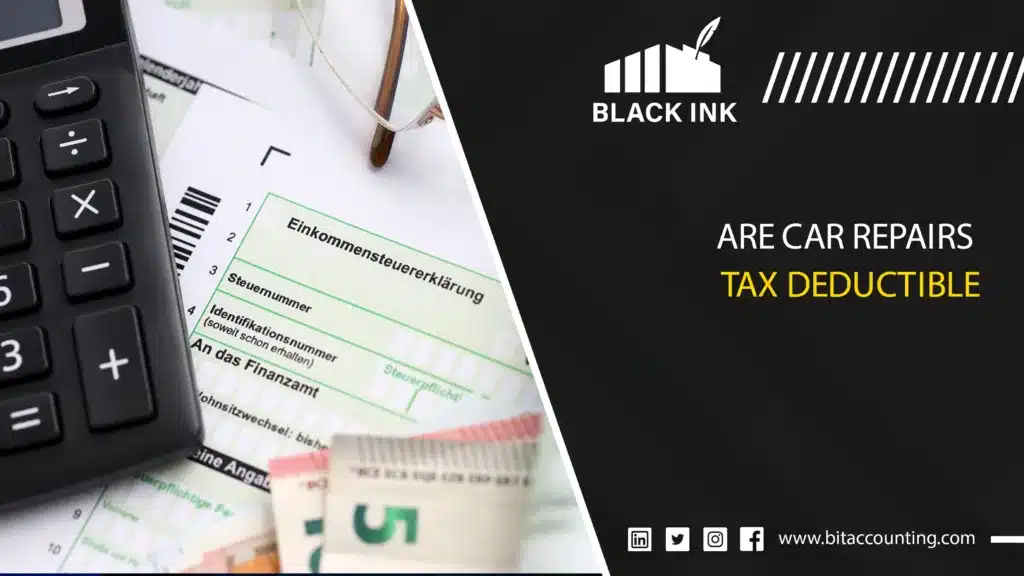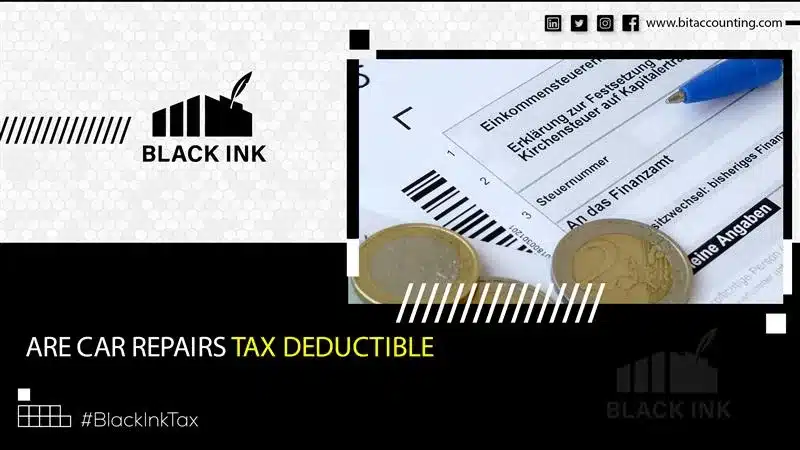
Table of Contents
Tax Tips 101: Are Car Repairs Tax Deductible?
If you’re driving for work, you might be asking yourself, ‘Are car repairs tax deductible?’
If you own a car for work purposes, you could be eligible for a tax deduction of the repair costs. There are strict guidelines you have to follow. For most instances of car repairs, they are tax deductible only if the car’s use was for work. Let’s explain how this works and who can take advantage of these expenses.
Who Can Deduct Car Repairs On Their Taxes?
Not everyone can write off car repairs on their tax return. Here’s who may qualify:
- Self-employed workers like freelancers, gig workers, and owners of small businesses.
- Business owners who use a vehicle for company jobs or customer visits.
- Certain employees like Armed Forces reservists, qualified performing artists, and fee-based government officials under United States law.
If you fall into one of these groups, car repairs might lower your gross income through a tax deduction, helping your overall personal finance and possibly boosting your tax refund.
Who Cannot Deduct Car Repairs On Their Taxes?
In most cases, regular employees who drive to and from work can’t deduct car expenses anymore. After changes in public policy around taxation, only certain special groups can deduct transport costs without reimbursement. Always check the latest Internal Revenue Service (IRS) rules or ask a tax expert like Bit Accounting.
The Key Condition: Business Use
The key guideline is easy: business purpose prevails. If you’re driving for work or a side hustle, expenses count. If you’re just going back and forth to work, they don’t.
The expenses have to be common (standard for your profession) and necessary (beneficial or required for your company). For instance, if the customers are driven around by you or delivered by you, the repairs tally.
If the car was used for both personal and business purposes, then they have to be segregated:
- Maintain a work trip mileage log.
- Determine the percentage of business usage.
Maintaining clean records will ensure a seamless audit should the IRS audit your tax return.
What Counts as a Car-Related Expense for Tax Purposes?
Still questioning ‘Are car repairs tax deductible? ’ Thing is, you can deduct more than just repairs. Eligible vehicle-related costs include:
- Repair and maintenance (like oil changes or tire rotations at an automobile repair shop)
- Fuel and motor oil
- Depreciation of the car
- Lease payments if you rent your vehicle
- Parking and toll road fees during business trips
- Vehicle insurance covering your car for work
- Licensing and registration fees (license costs)
You have two ways to handle these expenses when filing taxes:
- Actual expenses method (track real costs)
- Standard mileage rate method (use a fixed rate per mile)
Two Methods for Claiming Vehicle Expenses (Including Repairs)
As we discussed, two methods exist to claim your tax deduction. Let’s explore in-depth:
Method 1: Standard Mileage Rate Method
This method is easy. You track your business miles and multiply by the IRS-set rate (e.g., 67 cents per mile in 2024, 70 cents per mile in 2025).
This rate includes:
- Fuel economy in automobiles
- Regular maintenance
- Basic depreciation
Even though you use the standard mileage rate, you can separately deduct:
- Parking fees
- Tolls
- Some loan interest or personal property taxes tied to your business car.
Note: If you use this method, you cannot separately deduct repair bills or auto shop charges.

Method 2: Actual Expense Method
With this method, you can track every dollar you spend on the car. In addition, deduct a percentage based on your business use.
You’ll need receipts for:
- Gas from filling stations
- Bills from auto mechanics
- Insurance payments
- Parking or tolls
- Repairs (routine only — major upgrades must be depreciated)
Using this method demands good record-keeping but often results in a bigger deduction for drivers with high costs or luxury vehicles.
Choosing the Right Method: Standard vs. Actual
So which one should you use? Well it’s typically depends on your situation:
- Standard mileage rate is easier if you drive a lot for work and have an economical car.
- Actual expenses method can be better if you have a pricier vehicle, high maintenance costs, or significant repairs.
Pro Tip: Run the numbers both ways! Compare your possible deductions to see which method saves you more money.
Switching rules:
- If you start with the standard mileage method, you can usually switch later.
- If you start with the actual expenses method, you may have to stick with it for that vehicle.
Note for leased vehicles: You must use the standard mileage rate method for the entire lease period if you choose it first.
The Importance of Record-Keeping
The IRS demands solid proof when you claim tax deductions.
Here’s what you need:
- A clear mileage log: date, reason for trip, starting point, ending point, miles driven.
- Receipts for gas, repairs, vehicle insurance, and maintenance services.
Apps like MileIQ (available for iPhone and Android) help automate tracking for busy gig workers and small business owners.
Poor records could lead to penalties, disallowed deductions, or even IRS audits.
How to Claim the Deduction
When filing your taxes:
- Use Schedule C (Profit or Loss From Business) if you’re self-employed.
- Use Form 2106 if you’re a qualified employee (like a reservist or performing artist).
If you’re unsure, working with a tax preparer like Bit Accounting or a CPA specializing in personal taxes or business law is a smart move. Proper financial services help you avoid mistakes in your income statement.
Conclusion
Car repairs are tax deductible, then, if your vehicle is used for commercial purposes. Choosing between the normal mileage rate and real expenses depending on your driving patterns and car expenses will help you to maximize your deductions. Good record-keeping is really important, and Bit Accounting may assist with that. Their knowledge will help you to negotiate your choices and optimize your deductions, so guaranteeing more money remains in your pocket.
FAQs
1: Can I deduct car repairs if I only use my car for personal trips?
A: No. Only business use qualifies for a tax deduction under United States tax returns.
2: Does fuel economy impact my deduction?
A: Yes, indirectly. Vehicles with better fuel economy usually cost less to run, which can affect your actual expenses.
3: Can I claim repairs done before I started using the car for business?
A: No. Only expenses from the time you started using the vehicle for business can be deducted.
4: What if I rent a car for business trips?
A: Renting costs like the lease or rental fee and fuel are deductible if used for work purposes.
5: Are electric vehicles treated differently for tax deductions?
A: Mostly no, but you might also qualify for separate tax credits for plug-in hybrid or electric vehicles, boosting your financial accounting.
GET FREE QUOTE FOR ALL OF OUR SERVICES
Black Ink will send you a free analysis of your current state and what would be the cost of managing either a separate accounting and bookkeeping services or a complete solution across New York, USA. Do get in touch and we will be happy to consult you with our bookkeeping services in NY, New York, USA.
